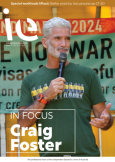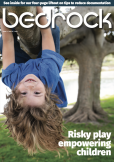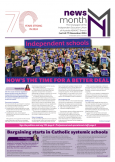
Researcher Maree Crabbe develops resources that aim to empower teachers to address pornography’s influence.
Undermining respect and consent
Pornography education expert Maree Crabbe develops resources for schools to empower teachers to tackle the effects of pornography on their students.
“Sixteen years ago, my colleague [David Corlett] and I identified the need to address pornography’s influence with young people in schools, and for public conversations about pornography to help people understand the scale and extent of pornography’s impacts on young people and the need to support them,” Crabbe says.
“There was this strong sense that young people were navigating this emerging, incredibly accessible content, alone,” she says.
Crabbe cites Australian research that shows 48 per cent of boys have seen porn by the age of 13 and 48 per cent of girls have seen it by the age of 15. Fifty-six per cent of young men report using porn weekly and 17 per cent use it daily; 15 per cent of young women use porn weekly and 1 per cent use it daily.
Sixty per cent of young men and 41 per cent of young women have used pornography as a source of information about relationships and sex in the past 12 months.
The kinds of messages conveyed through pornography are also reinforced in other online settings. Reporters at Guardian Australia conducted an experiment, creating a fake social media profile for a ‘generic’ 24-year-old male. Despite not posting anything on that profile, within just three months, the Facebook and Instagram algorithms had directed misogynist and sexist material to that profile.
“Pornography’s influence has serious implications for young people’s capacity to develop a sexuality that is safe, respectful, mutual and consenting,’ Crabbe says.
What schools can do
“I would never suggest that teachers alone should be responsible and not parents,” Crabbe says. “We need the input of a whole range of stakeholders and parents are a key group who have a role to play.”
Nonetheless, Crabbe believes that teachers, like other adults in young people’s lives, need to address the real-world influences that are shaping young people’s experiences.
“There are lots of reasons why schools have an important role to play,” she says. “Schools are an effective site for health promotion. They have the capacity to contribute to the education of a broad audience and are key contributors to young people’s sexuality education. We also know that many parents aren’t having conversations about pornography or sexuality with their children.
“Schools often mandate the use of the very devices that children see pornography on, and that brings accompanying responsibilities.”
How to start the conversation
Support from school leadership is crucial, Crabbe says. “It’s not up to individual teachers to single-handedly incorporate content about pornography into their teaching,” she says.
“There needs to be a considered, careful, whole-school approach to addressing this issue.”
Crabbe says she has worked with many independent schools, including faith-based schools of various denominations, that identify addressing pornography as aligning with their core values.
“For many schools, values such as kindness, respect and equality are part of their philosophy,” Crabbe says. “Although it is a challenging and sensitive topic, schools are often aware of young people being harmed by pornography.”
Teachers need support to deliver the consent curriculum. Schools need to engage with their parent communities to help them understand why this needs to be addressed so their children can engage in the world safely, effectively and respectfully.
“Pornography makes it even more important that we’re doing good consent education, as well as addressing broader popular culture influences that undermine consent messages,” Crabbe says.
AI exacerbates the issue
The impact of pornography has been further complicated by the recent development of apps that can use AI to ‘nudify’ people. There have been cases of students’ faces and teachers’ faces being used in these apps.
Legislation has not caught up with technology and these apps are not illegal.
Australia’s eSafety Commissioner Julie Inman Grant recently appeared at a Senate Inquiry into legislation to criminalise deepfake pornography. She has now sent a transparency notice to tech giants including Apple, Microsoft and Google, asking them what they’re doing to tackle AI-generated child abuse material.
Resources at the ready
Crabbe’s website, ‘It’s Time We Talked’, provides information about her resources including In the Picture, a secondary school resource on explicit imagery.
She also provides parent education and professional development for teachers and other school staff.
Crabbe and her team have developed school resource packages, one of which includes 10 curriculum activities for use with young people in schools, along with professional learning for school staff.
There are shorter versions for the whole staff community that support a whole-school approach, and a longer course for health teachers and wellbeing staff.
Crabbe says there is a need for more resources, particularly tailored approaches, aimed at students with a disability and students from culturally and linguistically diverse backgrounds.
She has recently developed a resource designed to support autistic young people.
“You don’t need to hear many stories about how pornography is harming young people to be compelled to address this in a coordinated way and integrate it into school-based education,” she says.
References
Chanel Contos, Consent Laid Bare: Sex, Entitlement and the Distortion of Desire, Pan Macmillan Australia, 2023
Maree Crabbe, It’s Time We Talked, website and resources: itstimewetalked.com
Sexual strangulation can mean ‘minutes to death’, yet half of young people do it, SMH, 2 July 2024, bit.ly/SMHstrangulation
We unleashed Facebook and Instagram’s algorithms on blank accounts. They served up sexism and misogyny, The Guardian Australia, 21 July 2024, bit.ly/Guardianalgorithms
eSafety Commissioner calls for power to ban accounts to help battle AI deepfake pornography, ABC Radio National, 24 July 2024: https://ab.co/46QCMTW














































































































































